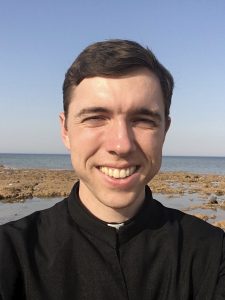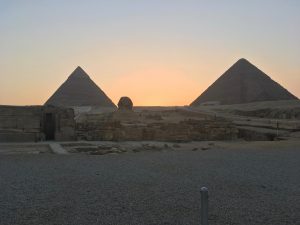My name is William Manaker, and I’m a Jesuit studying in the English MA program at Loyola. This past summer, I had the opportunity to travel to Egypt and spend six weeks doing intensive Arabic study. I arrived in Cairo just after the Eid al-Fitr at the close of Ramadan. During my time in Cairo, I lived at the College Sainte Famille, a school run by the Jesuits in the
Faggala district. Faggala is known as the center for bookstores and other office and school supplies within Cairo. Trucks and vans were constantly coming in with loads of notebooks, pens, textbooks, and other wares. Just a few minutes’ walk away were Ramses Square and Ramses Station, the principal train station for the city.
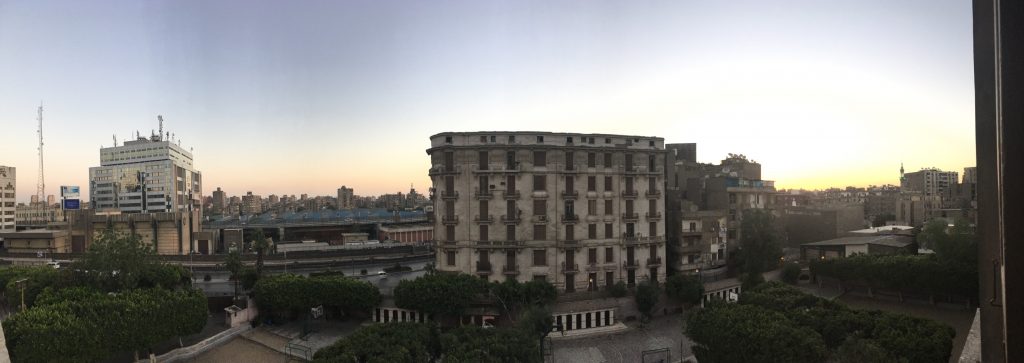
Figure 1. A view from my window just after dawn. The train tracks leading into Ramses station are not quite visible—but I could hear the trains coming at all hours.
I lived with the Jesuit community at the school, a collection of about a dozen men who worked in various roles and ministries. Most were from Egypt, but there were also a few others: one from Poland, one from India, and one 89-year-old Jesuit from the Netherlands who had been in Egypt for decades. In the community, we mainly spoke Arabic, but some of the Jesuits also spoke French and some English. One of my favorite pastimes was to sit at the
supper table and listen to the Jesuits joke, argue, and talk about various subjects in Arabic. In my first two weeks, I felt overwhelmed by the dialect and the rapid pace of their speech, but with time (and a great deal of kindness on their part!) I began to understand more and even participate in the conversations.
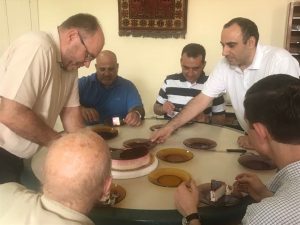
Figure 2. A birthday celebration in the Jesuit community. We enjoyed a little cake and also sang together in Arabic.
I studied Arabic at a language institute called Dar Comboni, which is run by a Catholic religious order. Dar Comboni is located in Zamalek, a well-known district of Cairo located on an island in the middle of the Nile River. In order to get to and from Zamalek, I typically rode the bus from Ramses Square, which was a whole experience in itself. If you could not reach the
driver, you would typically just pass your money forward, and it would go up in a chain to the driver and eventually return to you as a ticket, as well as change if needed. The first time I saw this process, I marveled at it, because it was so foreign to me—I’ve never seen anything like it here in the United States.
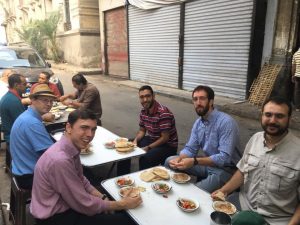
Figure 3. Breakfast with a few Jesuit friends—Egyptian, American, and French—at a shop around the corner from our school. We’re eating a typical Egyptian breakfast: fūl (فول), or fava beans, vegetables, and bread. This was definitely the best fūl I had in Cairo.
At Dar Comboni, I opted for an intensive course and took five hours of one-on-one lessons every day, with two hours in the Egyptian colloquial dialect and three in Modern Standard Arabic. The switch between the colloquial and formal dialects was sometimes difficult—and my teachers would insist on using the proper vocabulary and pronunciation. For the formal Arabic, It was a demanding schedule, and on top of my class time I also had homework to do. Thankfully, break time was built into the schedule, with at least ten minutes free every hour. There was a little tea room where students and teachers would sit and make a cup of tea or coffee (I especially liked the mint tea and the hibiscus tea). Even with the difficulty, I enjoyed the studies immensely.
One of my favorite things about my experience at Dar Comboni was simply getting to know my teachers. During my six weeks there, I studied with four different people. I began studying colloquial Egyptian Arabic with Amru, who was kind yet demanding in his lessons. Amru enjoyed literature, and since that is the subject I’m studying for my master’s degree at Loyola, we would often chat about different authors during breaks. After studying with Amru for about two weeks, though, I switched teachers, because Amru was getting married. Amru even invited a few of his students to his wedding reception—I was honored to be able to go and congratulate him and his wife. After Amru left for his honeymoon, I studied colloquial Arabic with Ashgan, a woman who had been working at Dar Comboni for over twenty years, and who had much wisdom to share. For formal Arabic, I studied with Entisar and with Sabry. Entisar and I discussed all sorts of topics: religion, politics, food, clothing, and more. Sabry was another veteran teacher, and he worked with me on Arabic grammar—and he would always visit the café (’ahwa) down the street during breaks for a smoke.
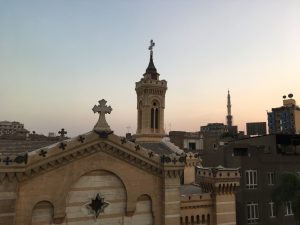
Figure 5. A view from the roof of the Jesuit school in Cairo. The church is in the foreground, and the minaret of the Masjid al-Fatḥ is in the background.
Although in many ways the main purpose of my time in Cairo was to study Arabic, faith was an integral part of my experience there. When I arrived in Egypt, I was visiting a predominantly Muslim country for the first time. There were several things I noticed just from looking around: most of the women wore the hijab, and I saw many mosques, from large, grand ones like the Masjid al-Fatḥ (مسجد الفتح) near the Jesuit school, to smaller ones tucked in
between shops. I also visited a mosque for the first time while I was in Cairo, and found it a quiet, prayerful place. In my lessons as well, my teachers and I did not shy away from religious topics, even though I was a Christian and they were Muslims. For me, it was a fruitful experience of dialogue and a shared desire to serve God.

Figure 6. A view from inside the Al-Azhar Mosque, which is located in Islamic Cairo. My trip to Egypt was the first time I had ever visited a predominantly Muslim country.
As a Christian, my time in Egypt also had a special significance for me because of the long history that Christians have there. I visited many ancient Christian churches, learned about the Coptic Christian community and its history in Egypt, and would attend liturgies in Arabic on a regular basis. I especially treasured the visits to several different monasteries, including the Monastery of St. Anthony, a third- to fourth-century Egyptian monk who is considered the father of monasticism within the Christian tradition. It was a privilege to go and pray in that holy place with some of my brother Jesuits.
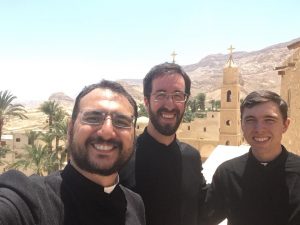
Figure 7. Visiting St. Anthony’s Monastery with some of my Jesuit brothers. We’re wearing traditional religious garb.
Since returning from Egypt, I have made an effort to keep using my Arabic and retain what I learned. In the Jesuit community at Loyola, there are two others who have studied Arabic and spent time in the Arab world, so the three of us regularly get together to have lunch and speak only Arabic as a way to practice. In addition, I regularly make appointments with Ola, the Arabic coach at the LLRC, and occasionally attend the Divine Liturgy at the Melkite Rite parish in Northlake, where the liturgy is in both Arabic and English. While these practices are nothing like being fully immersed, it helps me to keep sharp and maintain some of my fluency. In the future, however, I hope and pray that God will give me the chance to go back to Egypt and learn more.

